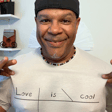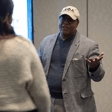
23. Psi | The Neuroscience of Goal-Setting with Maria Maldonado Smith
Maria Maldonado Smith gets into the neuroscience and benefits of goal-setting. The leadership coach and speaker visited "Ethocast" to talk about how goal-setting fits into college fraternity and sorority life as well as the importance of members leaning on each other to meet their goals.
About the Guest
Maria Maldonado Smith is the chief empowerment officer of MMS Consulting Firm and creator of the Executive Vision Imagery program. After 18 years of award-winning success in the corporate space, working as a sales leader for Fortune 500 companies across three different industries, Maria brings her unparalleled combination of experience to her proprietary process and interactive training, helping companies understand the neuroscience and benefits of goal-setting for their employees. She equips leaders, employees and organizations to clearly define goals and create a roadmap to achieving them, which allows for better alignment with corporate culture, leading to increased productivity and profitability.
Maria has served numerous national and international clients, including U.S. House of Representatives, Johnson & Johnson, Disney, Paramount Studios, and Constellation Brands. Growing up as the daughter of an immigrant parent, goal-setting has always been a way of life for Maria. At age 9, she set goals to become the first college graduate in her family and to earn the title of Miss Kentucky. Maria graduated from the University of Kentucky with a degree in political science, won the title of Miss Kentucky, and competed in Miss America in 2005.
A sister of the Beta Psi chapter of Alpha Delta Pi, Maria served as executive vice president and began honing her leadership and professional development skills. Her proprietary process has been an essential practice in achieving these goals and many more throughout her career and personal life. Maria has performed twice at Carnegie Hall and sang the National Anthem for an audience of over 120,000. She and her husband of 20 years raise their three children in a loving and encouraging environment where anything is possible when you set a goal and create a vision for it.



















